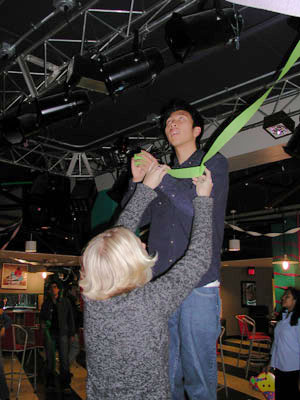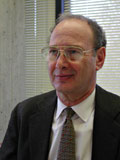|
Audio
Photos
More from MPR
Resources
Respond to this story
|
Cultural audit calls for campus change
November 15, 2002
 |
| Members of the International Students Assocation hang streamers in preparation for a dance in the student center. (MPR Photo/Jeff Horwich) |
Collegeville, Minn. — The so-called "cultural audit," drafted by Washington DC-based Nichols and Associates, is long: 147 pages. That's both good and bad for its prospects as a useful tool on campus. On one hand, the report is easily the most detailed document the campus community has seen on the beliefs and experiences of students and staff.
But it is also detailed enough to allow anyone to spin the numbers to suit their own purposes. And there are already people lining up to poke holes in its methodology.
Provost Michael Spitzer is concerned that the study itself not become a divisive issue on campus. He doesn't agree with every observation, but says everything in the report will be helpful information.
 | |||
"Every university, I think, has issues and problems that it needs to deal with, and these are ones we're working on," he said. "But we're not trying to hide anything. We're trying to accept openly that there are some issues that we want to focus on working on improving and we're going to do our best."
The report recommends setting up an office of Minority Affairs; Spitzer says that's a possibility. So is one hour per week of diversity training for faculty and staff. And Spitzer agrees that hiring committees across the University should play by the same rules and assure a fair playing field for minorities.
He is not so keen on a blunt suggestion that the school fire "several" unnamed vice presidents and deans, whom the report calls "marginally effective and non-progressive."
"Maybe that's something (someone) said in a focus group or in an interview with (Nichols), but frankly that's a recommendation I wish had been left out because I don't think it's appropriate," Spitzer said.
Human Relations professor Semya Hakim, a faculty member active in the diversity debate, is also uncertain about this particular suggestion. "I'm not entirely sure it's about firing people or not firing," she said. "It's about making sure people in those positions are doing what they are supposed to be doing."
Hakim sits on a committee that will craft the findings of the Nichols cultural audit into actual reforms this spring. The committee will have additional studies to pull from. The Equal Employment Opportunity Commission and Jewish Community Relations Council of Minnesota and the Dakotas have both done recent reports on the St. Cloud State campus.
The cultural audit found some of the same problems as its predecessors. Forty percent of faculty and staff who completed the survey felt white males are promoted at a faster rate than other groups. One-fifth believed submitting a discrimination complaint would have a negative effect on their career. Among students, whites and Christians had more favorable impressions of their college years.
Hakim says the challenge remains turning these critical observations into changes the community can appreciate.
"A lot of what's in there, I think, validated what faculty of color and international faculty have been saying, and students of color and international students, which is that it's a difficult place to be. In that sense, I don't want to say it's good, but it's nice to see it on paper," Hakim said.
"On the other hand, I'm skeptical about what is going to happen. But I hope we pay attention to the students."
She's thinking of students like Lydia Shuna, the St. Cloud State junior who leads student government's cultural diversity committee. One of her biggest concerns is the high turnover rate among minority faculty.
"These teachers have gone through some of the stuff that students go through every day," Shuna said. "You get to know these professors, and a semester later after you've gone through so much with them, they're not there. And that just rips your heart."
Shuna says making the campus more welcoming is the only way to keep minorities here. She and student government will get a chance to chime in soon enough. Last year they also commissioned their own study of campus climate. That report, by researcher Sue Ranking, is due out in the next few weeks.
|
News Headlines
|
Related Subjects
|
